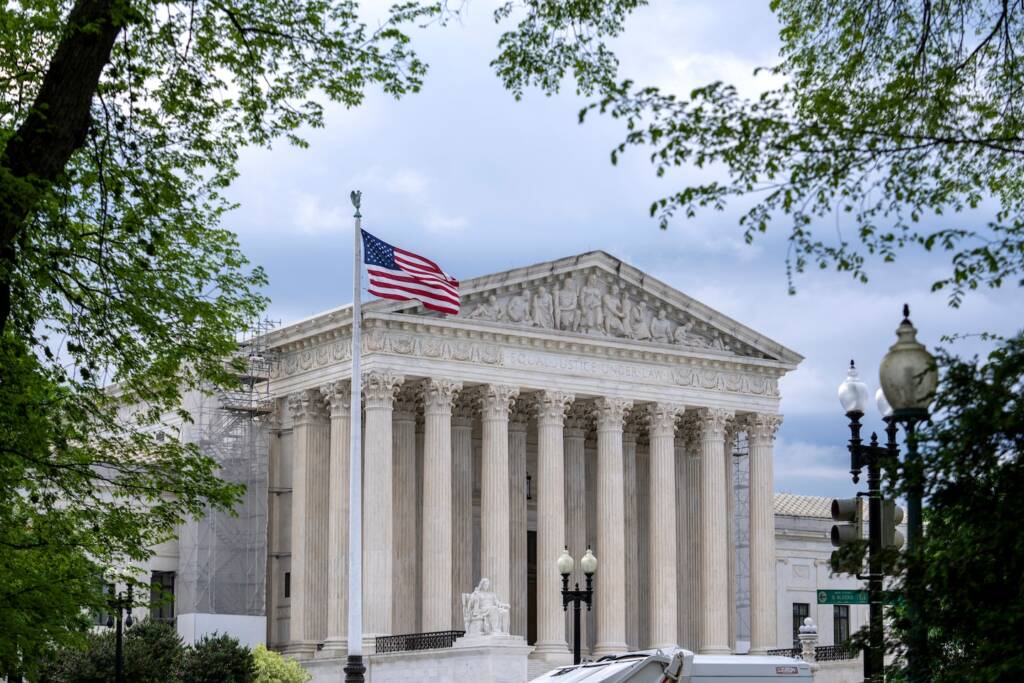Supreme Court Narrows Injunctions, Paving Path for Trump’s Birthright Citizenship Proposal
WASHINGTON — In a significant legal development, the U.S. Supreme Court ruled 6–3 on Friday to limit the scope of nationwide injunctions issued by federal judges — a decision that gives a substantial procedural win to former President Donald Trump’s administration and its controversial plan to end automatic birthright citizenship.

The ruling does not decide the legality of Trump’s proposal itself, but instead focuses on the reach of judicial power in blocking executive actions. Specifically, the Court held that lower courts may no longer issue universal injunctions that block federal policies across the entire country unless those injunctions are narrowly tailored to the plaintiffs directly involved in the case. This ruling opens the door for the Trump administration to begin implementing its birthright citizenship initiative in states that did not sue to stop it, while continuing to face restrictions in jurisdictions where legal challenges remain active.
The 14th Amendment in Focus
The Constitution’s 14th Amendment has long been interpreted to guarantee automatic citizenship to nearly all individuals born on U.S. soil, regardless of their parents’ immigration status — a principle that has enjoyed bipartisan support among legal scholars for generations. The Trump administration, however, has sought to reinterpret this clause, arguing that birthright citizenship should be limited only to children born to at least one U.S. citizen or lawful permanent resident.
The administration issued an executive order on President Trump’s first day in office in January to formalize this interpretation. That order was quickly met with a barrage of lawsuits, including from Maryland, Massachusetts, and Washington state. Federal judges in those cases issued nationwide injunctions halting the policy’s implementation.
What the Supreme Court Ruled
In the majority opinion, Justice Amy Coney Barrett wrote that the use of sweeping, nationwide injunctions goes beyond the authority of the courts and can undermine the separation of powers.
“When a court concludes that the executive branch has acted unlawfully, the answer is not for the court to exceed its power, too,” Barrett stated.
She clarified that courts may still issue injunctions, but only to the extent necessary to provide relief to the specific plaintiffs involved. Barrett instructed lower courts to move “expeditiously” in reassessing the breadth of their injunctions.
The Court’s ruling allows the Trump administration to proceed with planning and administrative steps toward enforcing the new policy, which is scheduled to go into effect 30 days from the date of the ruling — unless new, narrower legal challenges succeed in halting it again.
Fierce Dissents from Liberal Justices
Justice Sonia Sotomayor delivered a scathing dissent from the bench, calling the ruling “a travesty for the rule of law” and “an open invitation to bypass the Constitution.” She warned that limiting the courts’ ability to issue broad injunctions will weaken federal judicial oversight and urged plaintiffs to immediately begin filing class-action lawsuits as a workaround.
Justice Ketanji Brown Jackson, in a separate dissent, described the ruling as “an existential threat to the rule of law,” underscoring the concern that this decision prioritizes executive power over judicial checks and balances.
What’s Next for the Policy?
While the decision technically allows Trump’s policy to proceed in several states, it remains blocked in others — most notably in New Hampshire, where a separate injunction is in place. Legal experts anticipate a flurry of new lawsuits from state governments, civil rights groups, and immigrant advocacy organizations seeking to block the policy within their jurisdictions.
William Powell, an attorney representing challengers in Maryland, vowed to continue fighting:
“Even without a universal injunction, we will continue to litigate this case to ensure that every child born in the United States receives the citizenship that the 14th Amendment promises them,” he said.
The American Civil Liberties Union (ACLU) called the decision “troubling but limited,” emphasizing that lower courts still have time to adjust injunctions before the 30-day countdown ends.
New Jersey Attorney General Matthew Platkin, whose state is a plaintiff, said he remained confident that the executive order would ultimately be struck down.
“And in the meantime, our fight continues,” Platkin said.
Broader Implications
The Trump administration and its allies have frequently criticized the use of nationwide injunctions, arguing that they allow individual judges to block national policies supported by millions of voters. The Department of Justice has recorded dozens of such injunctions against Trump-era policies — ranging from immigration crackdowns to cuts in federal agencies — and argued they undermine presidential authority.
While previous Democratic and Republican administrations have also faced nationwide injunctions, their frequency has increased sharply in recent years, especially in response to Trump’s aggressive use of executive orders.
Although Friday’s ruling does not address whether Trump’s citizenship policy is constitutional, it could influence a wide range of future litigation where presidential power is contested. Legal scholars say the decision marks a shift toward a more restrained judiciary — and potentially a stronger executive branch.



